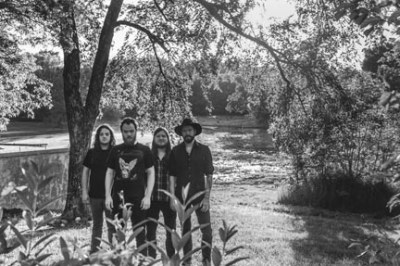
Johanna Sadonis of LUCIFER, by Burning Moon
While preparing to launch her second band and release her second debut album in as many years, Johanna Sadonis, formerly of The Oath and now of Lucifer, spoke to Ghost Cult about the authentic sound of Lucifer I and why the music of yesteryear is at the core of her bands’ identity.

Lucifer I (Rise Above) has a very authentic, organic, warm 70’s sound to it. Was it difficult, in this age of Pro-tools and plug-ins to find place that would allow you to record in an older style way, and someone skilled enough to do it?
“I didn’t look in the places you would normally look for a band that plays rock and metal. I was working at a record store and there was a guy who plays session bass for a lot of different bands and he said he had to go to the studio to record something with guitar player from The Swans for a side project. He came back with 4 or 5 songs and he played them over the big system in the record shop. And I said “It sounds amazing. It sounds like a 1960’s Serge Gainsbourg record!”, so I asked how on earth did he do this in one day, and he said the guy they recorded with (Ingo Krauss) was a true wizard!”
“He actually used to run Conny Plank’s studio, the old hero of the Krautrock scene, and he told me it was full of vintage equipment, so I asked for the contact. It was good to take it out of the context of going to one of the normal metal studios.”
“It was a good thing to do. He did an amazing job and we were able to record live. You don’t have clicks so you have an organic flow to the music, and it can be a magic trick to have that. So, we went to an old studio with all this vintage equipment, and it sounds so much more organic, and you’re able to record live and you hear the little flaws. It’s not over-produced because that would take the life out of it.”
Occult rock is a very “in” scene to be involved in. Why do you think this is, and do you associate with the other bands coming from a similar vibe?
“I’m sure it’s popular for similar reasons. People realise where the real gems are lying. It’s hard in rock and metal to reinvent the wheel and (when people try to) there have been such abominations of style and sub-genres that have been looming over the last couple of decades that have been quite horrible, you know? Also the horrible productions…”
“You look, and you have to return to the roots. But a lot of bands do that, bands that have been around for a long time, maybe during the 90’s they had a horrible phase trying out other stuff that was in fashion then, but now they return to their raw roots, because they realise where it’s at.”
Ha! I always think of Paradise Lost when you talk about bands doing things like that. I loved the earlier stuff, then they took some musical decisions I didn’t like, and I lost touch, though I’m pleased to hear they’re supposed to be heading back to their earlier sound…
“I guess you have to do that if you play music for a long time because you don’t want to repeat yourself. But, hopefully after you make a horrible album you return to what’s right! But everyone does it – even Sabbath with the last album tried to re-invent the old feeling. Whether it worked or not is another question… Or Danzig, the last album is much more back to the roots and to a raw production.”
“I don’t compare Lucifer to other contemporary bands, even those in the same genre although I am friends with many of those bands. I respect their stuff, and we look back to the old influences. I’d rather have a band looking up to those old classics than trying to copy the copy of a copy.”

What is the attraction of a musical style and aesthetic that is older than you are?
“It’s part of a long journey. Being a metalhead for more than 20 years, and going through various different phrases I started with classic metal, of course, but then I went really into death and black and doom. But then when you get older and you start to open your mind a little more, you start to dig more into the historical paths of music.”
“When you’re a music nerd, you start digging, and I came to realize all the bands were based on these classic bands that have been there for 50 years, and you examine why have these bands been here for all this time. Why are Black Sabbath, Deep Purple, Uriah Heep classic bands and so good? If you’re a music lover or musician you hear all that and it’s all genuine.”
“So, here I am, at this stage in my life and I have the taste of a 56 year-old man, you know!”
It’s weird, isn’t it, when you come round to listening to the same music as your parents did…
“Exactly! My Dad listened to Deep Purple, and my Mum was into rock n’roll. When I was 13/14, I thought this is not cool! You don’t want to listen to what your parents listen to, because you’re brought up with it. It’s not something you can find your own individual space, because your parents are there too. For me, it was Metallica and Danzig when I was 13. Later on you grow up and you realize “Oh shit! It’s amazing what my parents listen to! Give me all your records!!””
“So, now I listen to my parents records!”
Lucifer on Facebook
STEVE TOVEY














